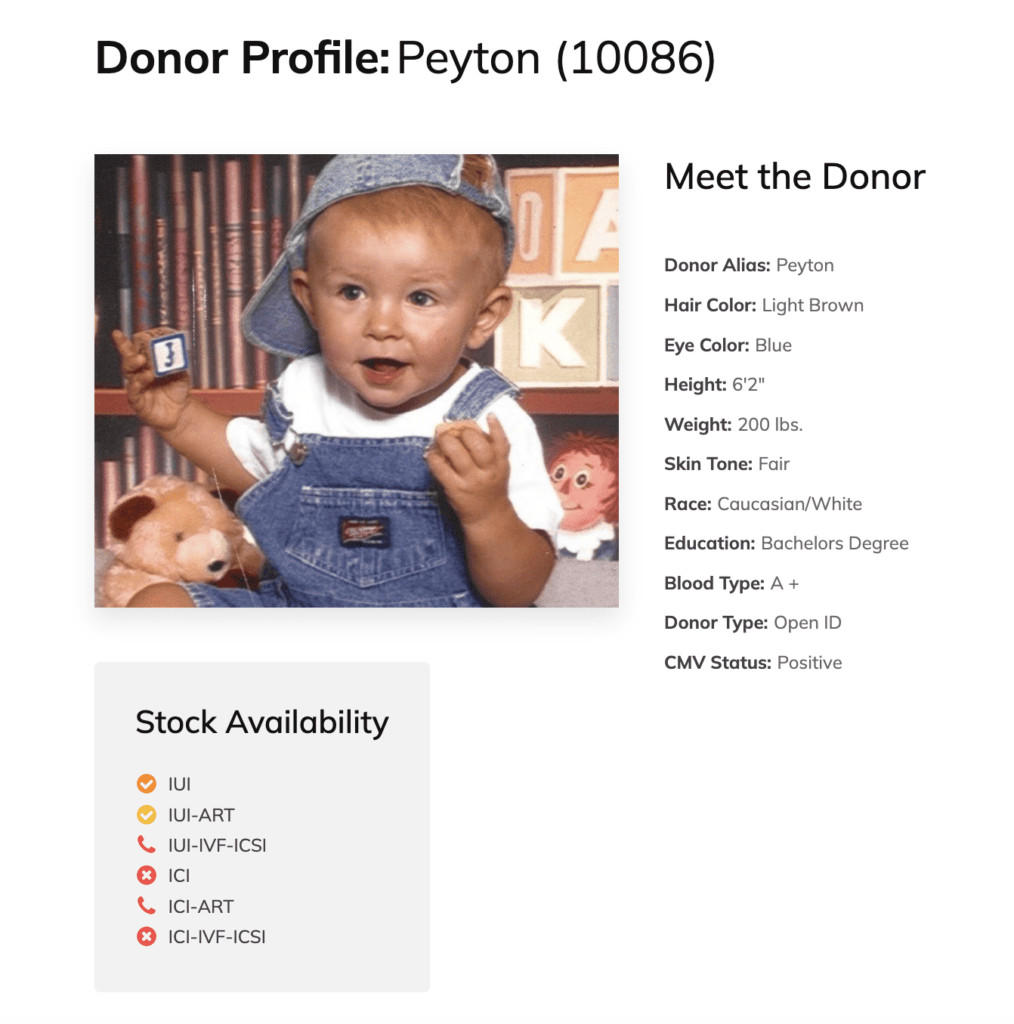When it comes to starting a family, there are many decisions you must make. One of those decisions is choosing a sperm donor. While this may seem like a straightforward process, it is crucial to prioritize the protection of one's health. There has been increased discussion and visibility of natural insemination (NI) in recent years, mainly due to online platforms and forums that connect individuals seeking sperm donors. While some people may choose natural insemination for various reasons, you should consider this method's potential risks. Opting for a sperm bank and artificial insemination (AI) can increase safety and peace of mind.
Key Takeaways
- Natural insemination carries risks of sexually transmitted infections and unwanted pregnancies.
- Choosing a sperm bank provides quality control measures and screening/testing of donors.
- Donor anonymity and confidentiality are maintained, but recipients can access medical history and donor profiles.
- Legal protections exist for both donors and recipients in the sperm bank process.
- Artificial insemination can provide better chances of pregnancy.
- While cost and accessibility may vary, making an informed decision for your health is crucial.
What is Natural Insemination?
Natural insemination refers to the process of conceiving a child through sexual intercourse with a sperm donor. Unlike sperm banks, natural insemination involves direct contact between the donor and the recipient. While some individuals may prefer this method due to its perceived intimacy, it is essential to consider the potential risks involved.
The Risks of Natural Insemination
When it comes to natural insemination, there are several health risks that both donors and recipients should be aware of. Firstly, there is an increased risk of sexually transmitted infections (STIs) as there is direct contact between the donor and recipient. Additionally, there is a lack of quality control and screening measures in place, which can lead to potential genetic disorders or other health complications for the child.
From a legal standpoint, natural insemination poses risks for both parties. Donors may face unexpected legal responsibilities and obligations towards the child without proper legal agreements. Similarly, recipients may encounter difficulties establishing legal parentage or obtaining financial support from the donor.

The Benefits of Choosing AI Over NI
| Benefit | Assisted Hatching May Benefit: |
| Increased chances of conception | Sperm banks offer a wide selection of healthy and viable sperm, increasing the chances of successful conception. |
| Screened donors | Sperm banks thoroughly screen and test their donors for genetic and infectious diseases, ensuring the safety of the recipient and any resulting offspring. |
| Privacy and anonymity | Sperm banks offer the option to donate anonymously, allowing recipients to maintain their privacy and avoid potential legal or emotional complications. |
| Access to medical history | Sperm banks provide detailed medical histories and updated reports of their donors, allowing recipients to make informed decisions about their choice of donor and potential health risks. |
| Convenient and flexible scheduling | Sperm banks offer flexible scheduling options for donors and recipients, making sperm donation and insemination more convenient and accessible. |
Opting for a sperm bank offers numerous benefits when compared to natural insemination. Firstly, sperm banks provide increased safety and protection for donors and recipients. Sperm samples are thoroughly screened and tested for genetic disorders, infectious diseases, and other health conditions before being made available for use. This rigorous screening process significantly reduces the risk of passing on hereditary diseases or infections to the child.
Furthermore, sperm banks offer access to high-quality sperm from carefully selected donors. Donors undergo extensive screening, including medical and psychological evaluations, to ensure suitability. These screenings ensure that recipients have access to sperm from healthy individuals with desirable genetic traits, increasing the chances of a successful pregnancy.
Quality Control Measures in Sperm Banks That You Won't Get Through Natural Insemination
Sperm banks prioritize quality control measures to ensure the health and safety of recipients. The screening and testing process for sperm donors is comprehensive and stringent. Donors are required to undergo thorough medical examinations, including genetic testing, to identify any potential health risks. Additionally, they receive screenings for infectious diseases such as HIV, hepatitis, and syphilis.
Sperm samples are also subject to strict quality control measures. They are tested for motility, viability, and concentration to ensure their suitability for fertility treatments. By implementing these quality control measures, sperm banks assure recipients that they receive sperm from healthy and viable donors.
Screening and Testing of Donors
The screening and testing process for sperm donors ensures the health and well-being of recipients and their future children. Donors must undergo a series of evaluations to assess their physical and mental health. These evaluations include a comprehensive medical history review, physical examinations, and genetic testing.
Genetic testing is vital in identifying potential hereditary diseases that could affect future children. Donors receive screenings for conditions including cystic fibrosis, sickle cell anemia, and various genetic disorders. By conducting these tests, sperm banks can provide recipients with valuable information about the genetic health of their chosen donor.
Donor Anonymity and Confidentiality
Donor anonymity and confidentiality are essential considerations when choosing a sperm donor. Sperm banks prioritize the protection of donor identities to ensure their privacy. This anonymity allows donors to contribute without fear of future legal or emotional obligations towards the child.
Recipients also benefit from donor anonymity, as it allows them to make decisions about their family without external interference. It will enable them to focus on their desires and preferences when selecting a donor without feeling obligated to establish a relationship with the donor in the future.
Access to Donor Information and Medical History
One of the significant advantages of using a sperm bank is the access recipients have to comprehensive donor information and medical history. Sperm banks maintain detailed profiles for each donor, including physical characteristics, educational background, and personal interests. This information allows recipients to choose a donor who aligns with their preferences and values.
Furthermore, recipients have access to the donor's medical history. This information includes any known or newly developed genetic conditions or family health issues. This information is invaluable in understanding potential health risks for the child and making informed decisions about their future well-being.
Diversity of Donor Profiles
Sperm banks offer an extensive range of donor profiles, ensuring recipients have a diverse selection. Donors come from various ethnic backgrounds, allowing recipients to find a donor who shares their cultural heritage. Diversity is crucial for those who want to preserve their cultural roots or guarantee their offspring will inherit a varied genetic makeup.
The availability of diverse donor profiles also ensures that recipients can find donors who possess specific physical traits or talents they desire for their child. Whether it is eye color, height, or musical abilities, sperm banks provide an extensive selection to cater to individual preferences.
Legal Protections for Donors and Recipients
When using a sperm bank, both donors and recipients are protected by legal frameworks. This framework shields donors from legal responsibilities or obligations towards the child conceived through their donation. Recipients, on the other hand, are provided with legal protections regarding parentage and financial support.
These legal protections provide peace of mind for both parties involved, ensuring they can make decisions about their family without fear of future legal complications or disputes.
Cost and Accessibility of Sperm Banks
While the cost of using a sperm bank may be higher compared to natural insemination, the long-term benefits and peace of mind it provides make it worth the added costs. Sperm banks offer various pricing options, allowing recipients to choose a plan that suits their budget. Additionally, many sperm banks provide financing options to make the process more accessible.
Regarding accessibility, sperm banks have a vast network of locations, making it easier for individuals to access their services. These expansions ensure that individuals from different geographical areas have equal opportunities to choose a suitable donor and start their journey toward parenthood.
Choosing A Sperm Bank Over Natural Insemination For Your Health
Protecting one's health should be a top priority when choosing a sperm donor. While natural insemination may seem appealing due to its perceived intimacy and low costs, it comes with significant risks, both in terms of health and legality. Opting for a sperm bank provides increased safety and protection for both donors and recipients.
Sperm banks implement rigorous quality control measures, including comprehensive screening and testing processes for donors. Testing ensures recipients access high-quality sperm from healthy individuals with desirable genetic traits. Additionally, sperm banks offer valuable donor information and updated medical history, allowing recipients to make informed decisions about their future families.
By choosing a sperm bank over natural insemination, you can ensure optimal health and safety while embarking on parenthood. Making a calculated decision that considers long-term implications and provides the best possible outcome for all parties involved is crucial.
Natural Insemination and Artificial Insemination FAQ
What is a sperm bank?
A sperm bank is a facility that collects, freezes, and stores sperm from donors for use in artificial insemination procedures, such as IUI, ICI, IVF, ICSI, and home insemination.
What are the benefits of choosing a sperm bank over natural insemination?
Choosing a sperm bank over natural insemination can provide several benefits. These benefits include access to a wide range of donors, increased control over the selection process, and reduced risk of sexually transmitted infections and passing on genetic conditions.
Does natural insemination have a higher success rate than artificial insemination?
No scientific evidence suggests that natural insemination's success rate is higher than artificial insemination. Artificial insemination techniques have been developed and refined over many years to maximize the chances of successful conception. They allow for controlled and precise placement of sperm, which can increase the likelihood of fertilization.
Is using a sperm bank more expensive than natural insemination?
The cost of natural insemination can vary depending on the donor and the specific arrangement. Some NI donors may offer their services for free, while others may charge a fee. Using a sperm bank can be expensive, with costs ranging from $500 to $10,000 per cycle. However, many insurance plans cover the costs of fertility treatments, and many sperm banks offer financing options.
Can I choose the physical characteristics of the sperm donor?
Many sperm banks provide childhood and adult photos of each donor, allowing recipients to select donors based on physical characteristics. They also offer photo-matching services so recipients can choose a donor that closely resembles their physical traits.
Is using a sperm bank safe?
Using a reputable sperm bank is safe. They are regulated and inspected by the Food and Drug Administration (FDA) and Clinical Laboratory Improvement Amendments (CLIA) to ensure optimal safety. Additionally, sperm is stored and handled in a controlled environment to prevent the risk of contamination or infection.
- Protecting Your Health: Choosing A Sperm Bank Over Natural Insemination
- Hatching a Plan: Learning The Basics About Assisted Hatching in IVF
- Navigating GYN Surgery Before Artificial Insemination
- PGT Testing and Its Role in IVF Treatment
- The Ultimate Guide To Where You Can Donate Sperm In All 50 States
Gynecological (GYN) surgery plays a crucial role in the journey of patients undergoing artificial insemination. It is a specialized field of surgery that focuses on the female reproductive system, addressing various conditions and improving fertility outcomes. This comprehensive article will delve into GYN surgery, its basics, its importance for artificial insemination patients, and much more.
Key Takeaways
- GYN surgery can treat a variety of conditions, including endometriosis, fibroids, and infertility.
- Understanding the risks and benefits of GYN surgery is essential for making informed decisions.
- Different artificial insemination procedures exist, including intrauterine insemination and in vitro fertilization.
- Post-operative care and recovery tips can help manage pain and discomfort after surgery.
- Success rates and long-term outcomes of artificial insemination vary depending on individual factors.
Understanding the Basics of GYN Surgery
GYN surgery refers to procedures performed on the female reproductive system. It encompasses various procedures, including hysterectomy, myomectomy, ovarian cystectomy, and tubal ligation reversal. These surgeries treat multiple conditions, such as uterine fibroids, endometriosis, ovarian cysts, and tubal blockages.
For artificial insemination patients, GYN surgery is often necessary to address underlying conditions that may hinder successful conception. Correcting these conditions through surgical intervention significantly improves the chances of achieving a successful pregnancy. GYN surgery can help optimize patients reproductive health patients reproductive health and increase their chances of conceiving through artificial insemination.
Preparing for Artificial Insemination Surgery
You should take several steps before undergoing GYN surgery for artificial insemination. It is crucial to have a thorough consultation with your doctor to discuss your medical history, current condition, and expectations from the surgery. Your doctor will give pre-operative instructions, including dietary restrictions, medication adjustments, and lifestyle modifications.
During the consultation, your doctor will conduct a physical exam and provide additional tests to assess your reproductive health. This exam will help determine your specific condition's most appropriate surgical approach. You should be open and honest with your doctor about any concerns or questions during this process.

What Conditions Can GYN Surgery Treat?
| Condition | Description |
| Uterine Fibroids | Non-cancerous uterine growths that can cause heavy bleeding, pain, and discomfort. |
| Endometriosis | A medical condition characterized by the growth of uterine tissue outside of the uterus, resulting in discomfort and reduced fertility. |
| Ovarian cysts | A condition where the ovaries develop fluid-filled sacs, which can cause pain and discomfort. |
| Abnormal Uterine Bleeding | Heavy or irregular bleeding unrelated to a menstrual cycle. |
| Pelvic Organ Prolapse | A medical condition characterized by the descent of organs such as the bladder or uterus into the vaginal region. |
| Gynecologic Cancer | Cancer within the female reproductive system, including the cervix, uterus, ovaries, and fallopian tubes. |
GYN surgery can address a wide range of conditions that may affect fertility and hinder the success of artificial insemination. Some common conditions include uterine fibroids, which are benign growths in the uterus that may interfere with implantation and pregnancy. Endometriosis, a medical condition characterized by the growth of tissue outside of the uterus, can be effectively treated through GYN surgery. Surgical interventions can treat other conditions, such as ovarian cysts and tubal blockages.
By treating these conditions, GYN surgery can significantly improve fertility outcomes for patients undergoing artificial insemination. It creates a more favorable environment for conception and increases the chances of successful pregnancy.
Understanding the Risks and Benefits of GYN Surgery
GYN surgery comes with potential risks such as infection, bleeding, harm to nearby organs, and adverse reactions to anesthesia. These risks are generally low and can be minimized by carefully choosing a reputable surgeon and following pre-operative and post-operative instructions.
On the other hand, the benefits of GYN surgery for artificial insemination patients are numerous. By addressing underlying conditions that may hinder conception, GYN surgery increases the chances of successful pregnancy through artificial insemination. It optimizes patients' reproductive health and gives them a better chance at achieving their dream of starting a family.
The Different Types of Artificial Insemination Procedures
Artificial insemination encompasses two main procedures: intrauterine insemination (IUI) and in vitro fertilization (IVF). IUI involves sperm insertion directly into the uterus during ovulation, while IVF involves fertilizing eggs with sperm in a laboratory before the resulting embryos are transferred into the uterus.
Each procedure has its advantages and disadvantages. IUI is less invasive and less expensive compared to IVF but may have lower success rates in some instances. IVF, on the other hand, offers higher success rates but is more invasive and costly. The choice between the two procedures depends on various factors, including the patient's condition, age, and previous fertility history.
What to Expect During Your GYN Surgery Day
Be prepared and know what to expect on the day of your GYN surgery. You will likely need to arrive at the hospital or surgical center a few hours before the surgery. It is advisable to bring a small bag with any items you may need, such as comfortable clothing, toiletries, and any integral documents or paperwork.
The surgical process involves being prepped for surgery, which includes putting on a hospital gown and having an IV line inserted for fluids and medications. You will receive anesthesia to provide comfort and ensure you're pain-free during the procedure. The time it takes to complete the surgery will vary depending on the procedure.
Post-Operative Care and Recovery Tips
After GYN surgery, proper post-operative care is crucial for a smooth recovery. Your doctor will give you detailed instructions based on your condition and procedure. These instructions may include guidelines for wound care, pain management, activity restrictions, and follow-up appointments.
Follow these instructions diligently to minimize the risk of complications and promote optimal healing. Proper rest, a nutritious diet, staying hydrated, and avoiding strenuous activities are all essential to a successful recovery.
Managing Pain and Discomfort After GYN Surgery
Pain and discomfort are common after GYN surgery, but various options are available to manage them effectively. Your doctor may prescribe pain medications to minimize any post-operative pain. Take these medications as your doctor directs, and do not exceed the recommended dosage.
In addition to medication, applying heat packs or cold compresses to the surgical site can provide relief. Relaxation techniques and gentle stretching can also help manage discomfort. Communicating any persistent or worsening pain to your doctor is essential, as it may indicate a potential complication.
Potential Complications and How to Avoid Them
While GYN surgery is generally safe, potential complications can arise. These may include infection, bleeding, blood clots, damage to surrounding organs, and adverse reactions to anesthesia. However, you can minimize the risk of experiencing these complications by choosing a reputable surgeon, diligently following pre-operative and post-operative instructions, and seeking prompt medical attention if any concerning symptoms arise.
You should be aware of potential complications, such as excessive bleeding, severe pain, fever, or signs of infection. You can ensure a successful outcome by being vigilant and proactive in your recovery.
Frequently Asked Questions About GYN Surgery
- Is GYN surgery painful?
You will receive anesthesia during GYN surgery, so you will not feel any pain. However, you may experience some pain and discomfort after surgery. Your doctor will provide appropriate pain management options to alleviate discomfort. - How long does it take to recover from GYN surgery?
The recovery time after GYN surgery varies depending on the specific procedure and individual factors. It may take a few weeks to recover and resume normal activities fully. Your doctor will provide you with specific guidelines for your recovery period. - Will GYN surgery guarantee successful artificial insemination?
While GYN surgery can significantly improve fertility outcomes for artificial insemination patients, it does not guarantee success. The success of artificial insemination depends on various factors, including the patient's age, overall health, and the quality of sperm or eggs used.
Success Rates and Long-Term Outcomes of Artificial Insemination
The success rates of artificial insemination vary depending on several factors, including the patient's age, the cause of infertility, and the specific procedure performed. On average, the success rates for IUI and ICI range from 10% to 20% per cycle, while IVF and ICSI success rates can be as high as 20% to 35% per cycle.
Long-term outcomes for patients undergoing GYN surgery and artificial insemination are generally positive. By addressing underlying conditions that may hinder conception, GYN surgery increases the chances of successful pregnancy through artificial insemination. However, it is essential to note that individual results may vary, and it is advisable to consult with your doctor for more information regarding your specific case.
- Protecting Your Health: Choosing A Sperm Bank Over Natural Insemination
- Hatching a Plan: Learning The Basics About Assisted Hatching in IVF
- Navigating GYN Surgery Before Artificial Insemination
- PGT Testing and Its Role in IVF Treatment
- The Ultimate Guide To Where You Can Donate Sperm In All 50 States
What is CMV?
CMV, cytomegalovirus, is a member of the herpesvirus family and is highly prevalent worldwide. You can become infected with CMV through bodily fluids, including saliva, urine, blood, seminal fluid, and breast milk. The most common transmission modes are through close contact with infected individuals or exposure to bodily fluids. It is important to note that CMV can be present in an individual's body without causing any symptoms or illness, making detecting and preventing transmission challenging.
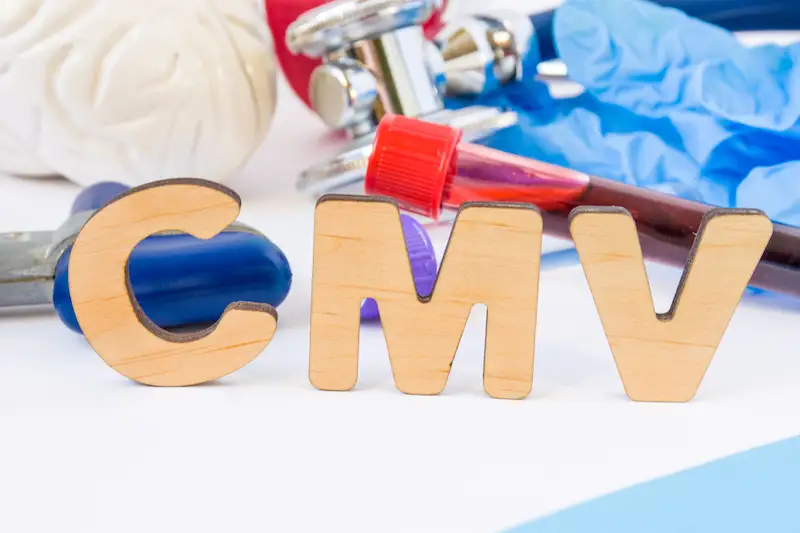
How Common is CMV?
The CDC states that nearly 1 in 3 children have already been infected with CMV by age 5, and by the age of 40, over half of the population is infected. The prevalence of CMV in sperm donors varies depending on the screened population. Studies have shown that CMV infection rates among sperm donors range from 30% to 70%. However, it is essential to note that the presence of CMV does not necessarily indicate active infection or the potential for transmission. Donor screening protocols typically include testing for CMV antibodies, which can help determine if the donor has contacted the virus in the past.
Symptoms of CMV Infection
CMV infection can manifest differently in individuals depending on their immune system and overall health. Many people infected with CMV may not experience symptoms or only have mild symptoms that resolve independently. However, those with weakened immune systems, such as individuals with HIV/AIDS or undergoing organ transplantation, may develop severe complications. These can include pneumonia, hepatitis, retinitis (inflammation of the retina), and neurological disorders. Awareness of these symptoms and seeking medical attention if necessary is crucial.
Becoming Infected With CMV
Primary CMV infection occurs in people who have never been exposed to the CMV virus before. Once a person becomes infected with CMV, the virus remains alive but dormant inside their body for the rest of their life. Recurrent CMV infection is when a dormant virus becomes active again. CMV infection is usually harmless and rarely causes illness. However, primary CMV infection can cause more severe problems for pregnant women than recurrent CMV infection.
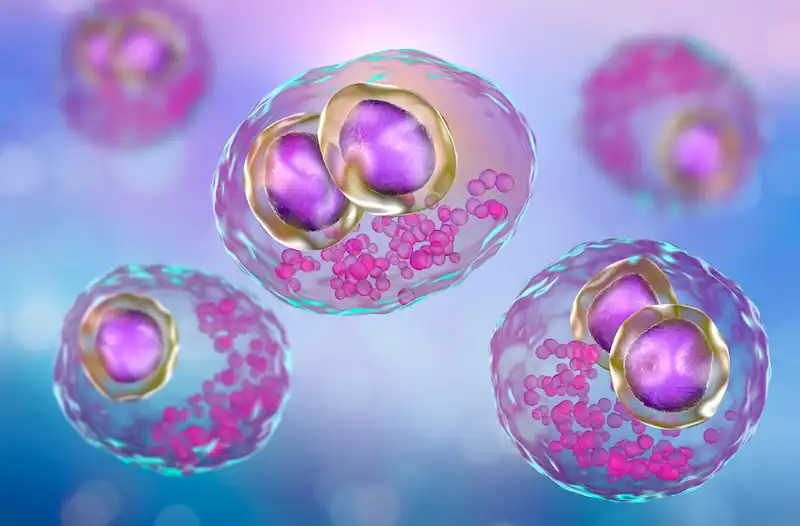
Cytomegalovirus
CMV in human cells.
Diagnosis and Treatment of CMV Infection
Diagnosing CMV infection involves various methods, including blood tests to detect the presence of CMV antibodies or viral DNA. Other tests like urine or saliva samples may also confirm active infection. Treatment options for CMV infection depend on the severity of symptoms and the individual's immune status. A healthcare provider may prescribe antiviral medications to manage the condition and reduce the risk of complications.
Prevention of CMV Transmission in Sperm Donation
Preventing CMV transmission in sperm donation involves following proper protocols and procedures. Donor screening for CMV antibodies is essential in identifying potential donors who may pose a higher risk of transmission. Additionally, implementing strict guidelines for handling and processing donated sperm can help minimize the risk of contamination. Cryopreservation techniques, such as freezing and quarantine periods, can also be employed to ensure that donated sperm is free from infectious agents before use.
CMV Protocols At Cryobank America
The FDA requires CMV testing on all men who intend to donate sperm. A positive result, however, doesn't necessarily mean that a man will be ineligible to donate. Cryobank America will obtain semen samples from potential donors and then quarantine those specimens for at least six months. During that time, the donor may have had CMV antibody levels tested several times. If the antibody tests indicate the possibility of a CMV infection close to the time of the sperm donation, the donor will not be allowed to donate their specimens. If the testing demonstrates inconclusive results, the donor will not be permitted to donate. However, if a donor tests positive for CMV IgG only, indicating a past infection, he will be eligible to contribute. These samples appear in the Cryobank America donor database as CMV-positive.
Can Washed Donor Sperm Transmit CMV?
No, clinically washed sperm is typically free from CMV (Cytomegalovirus) transmission. The sperm-washing process separates sperm from the seminal fluid, which reduces the risk of transmitting infections such as CMV. However, no medical procedure can guarantee 100% elimination of all viruses or infections. You should always consult a healthcare professional for personalized advice and information.
Considering Pregnancy Through Donor Sperm?
Women considering pregnancy with donor sperm should have CMV antibody testing as part of their IDT. Those with a past infection are at low risk of transmitting CMV infection to a fetus and are at little to no risk if they decide to use a CMV-positive donor.
Women never exposed to CMV should consider using a CMV-negative donor. Even though the risk from a CMV-positive donor is low, it is impossible to determine whether there will be a risk for infection.
Cryobank America's donor catalog has a CMV search filter for positive and negative sperm donors. To find a CMV-negative sperm donor, select negative under the CMV option!
CMV Resources
For additional information on CMV, this link is especially helpful:
https://www.mayoclinic.org/diseases-conditions/cmv/symptoms-causes/syc-20355358
If you have any questions about CMV, please email us at [email protected] or call 817-945-8708; we will be happy to help!
How To Prepare For At-Home Insemination Before Placing Your Vial Order
At-home insemination is a method of assisted reproduction that allows couples to conceive without medical intervention. It involves using donor sperm to inseminate the female partner at home. You can use any of our vial options for at-home insemination. However, our premium IUI and ICI vials are recommended over all other options, which you can learn more about by clicking here.
One of the main benefits of at-home insemination is the privacy and convenience it offers. Couples can avoid the stress and expense of fertility clinics and have more control over the process. Whether you are purchasing donor sperm for at-home insemination or to have a procedure performed at your fertility clinic, our Clinic Release Form must be signed and submitted to us before you can complete your online purchase.
First Steps in Preparing for At-Home Insemination
Health & Wellness Check
Before placing your vial order with Cryobank America, ensuring both partners are in good health and have undergone necessary medical check-ups and testing is essential. This assurance includes checking for any underlying medical conditions affecting fertility and testing for sexually transmitted infections. It is also advisable to consult with a healthcare professional to ensure that at-home insemination is a safe and appropriate option for you.
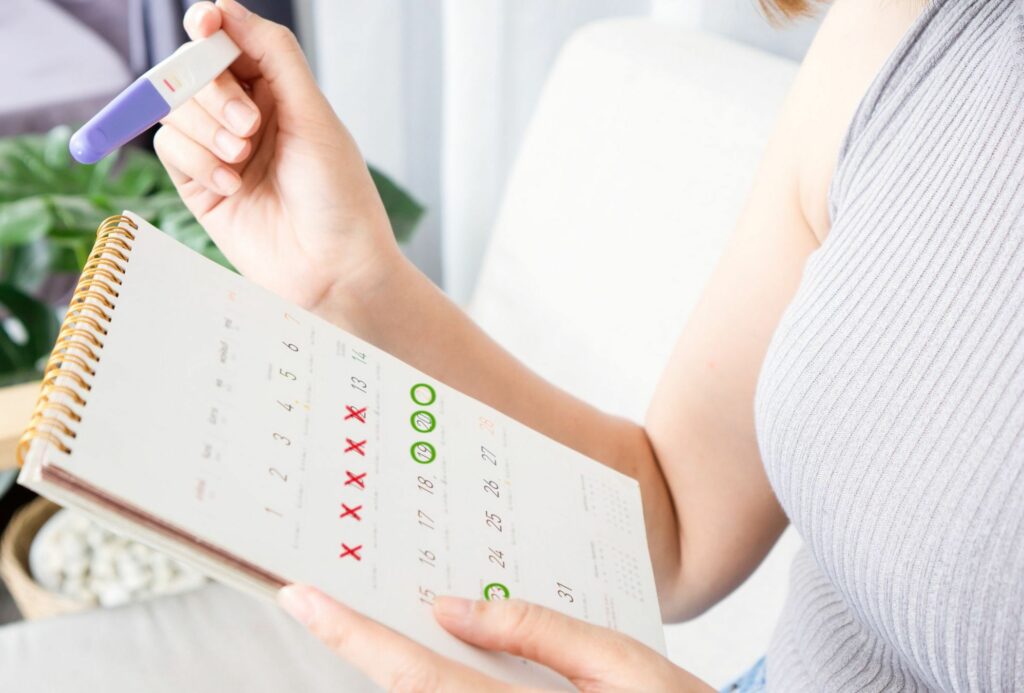
Timing is Everything: Effectively Tracking Your Ovulation Before Scheduling Your Vial Delivery
Understanding ovulation and fertility is crucial for maximizing the chances of conception through at-home insemination. You must plan your vial delivery just before your fertility window.
Several methods are available for tracking ovulation, including tracking basal body temperature, monitoring cervical mucus, using ovulation predictor kits, or tracking changes in the cervix. Each method has advantages and considerations, so trying different ways to find the one that works best for you may be helpful.
Timing insemination correctly is crucial for increasing the chances of conception. That's why we don't consider ovulation-tracking mobile apps to be a reliable method. These mobile applications can only provide a vague approximate fertility window. Use ovulation testing kits designed to track ovulation precisely and provide detailed instructions. Typically, these kits will include testing strips that monitor the presence and concentration of luteinizing hormone (LH) in your urine, which appears about 12 – 36 hours before ovulation. Insemination should occur within a day or two before ovulation or on the day of ovulation itself. Perfectly timing insemination ensures that the sperm is present in the reproductive tract when the egg is released, increasing the chances of fertilization.
I Ordered Donor Sperm, and My Vials Are Out for Delivery. What's Next?
Once you've purchased your vials from Cryobank America and our team has coordinated an excellent delivery time based on your schedule, you will receive a USPS tracking code. Your tracking code will tell you the exact date and approximate delivery time.
Once your delivery arrives, you'll receive your vials along with our at-home insemination kit. Our kit includes a pre-charged dry shipper containing your purchased vials, complete documentation, and a sterile syringe.
Our dry shippers are pre-charged in our laboratory to remain active during shipping. They transport biological specimens safely and hold cryogenic temperatures of -150°C or colder. Our dry shippers are manufactured with compounds that absorb liquid nitrogen, ensuring there won't be any spills during shipping. Each dry shipper ships inside a protective container to provide an additional layer of protection.
Your At-Home Insemination Kit
Your delivery will also include four valuable pieces of documentation consisting of the following:
- A package summary. Your summary will list what you ordered, including the vial type, quantity, and total cost for your purchase. It will also include an analysis of your vial's motility and sperm count.
- Infectious Disease Report. This information includes your selected donor's most recent lab testing and infectious/non-infectious disease reports.
- Complete instructions. This paperwork will guide you on handling your dry shipper, thawing your specimen, and performing insertion.
- Package return slip. We will also provide a return slip for your dry shipper.
Lastly, you will receive a ready-for-use sterile syringe. Remember, you have seven days from the shipment date to complete the insertion. If shipping your vials and accompanying equipment takes two days, you will have five days to perform at-home insemination.
Tips for Successful At-Home Insemination
Creating a comfortable and safe environment is very important during insemination. Make sure your space is clean and free from distractions. It may be helpful to create a relaxing atmosphere by playing soothing music or using aromatherapy.
Experts recommend lying flat or with your hips elevated for 25-30 minutes following gentle insertion. You can inseminate once if you're confident in your fertility window calculation. If unsure, consider inseminating twice.
Climaxing through clitoral stimulation can also increase your chances of conception. When a woman climaxes, her cervix becomes more receptive to sperm.
Refrain from strenuous exercise for a few days following insemination and continue to eat healthy. Eliminate processed foods with a high list of ingredients and stick to whole foods as long as possible. Avoid foods that are hard to digest, such as red meats, greasy foods, and refined sugar. Drinking alcohol or using tobacco products isn't recommended during your insemination, as they harm egg quality and fertility.
How We Can Help You Through Your Journey
Our assistance doesn't stop at shipping your vials! If you have any questions before, during, or after you've initiated your insemination, don't hesitate to pick up the phone. We've helped many individuals and couples who have embarked on this journey already, and we look forward to applying our expertise and genuine care to help make everything as easy and stress-free as possible.
- Protecting Your Health: Choosing A Sperm Bank Over Natural Insemination
- Hatching a Plan: Learning The Basics About Assisted Hatching in IVF
- Navigating GYN Surgery Before Artificial Insemination
- PGT Testing and Its Role in IVF Treatment
- The Ultimate Guide To Where You Can Donate Sperm In All 50 States
What is In Vitro Fertilization?
In vitro fertilization (IVF) is a fertility treatment that has helped millions of couples worldwide conceive and start families. It involves a complex process of fertilizing eggs outside the body and transferring them to the uterus. While IVF has become increasingly common, it is vital to understand the science behind it to make informed decisions about fertility treatments.
Understanding the Basics of IVF Fertility Treatments
IVF is a fertility treatment that involves fertilizing eggs outside the body and transferring them to the uterus. It is used when other fertility treatments have failed, or underlying medical conditions make it difficult to conceive naturally. The process involves several steps, including hormone therapy to stimulate egg production, retrieval, fertilization, and embryo transfer.
Not everyone is a candidate for IVF, and it is essential to consult with a fertility specialist to determine if it is the right option for you. Factors such as age, medical history, and overall health can all impact the success of IVF.
The Role of Hormones in IVF Fertility Treatments
There are several types of hormones used in hormone therapy for IVF fertility. These include follicle-stimulating hormone (FSH), luteinizing hormone (LH), human chorionic gonadotropin (hCG), and gonadotropin-releasing hormone (GnRH). FSH and LH are used to stimulate the ovaries to produce multiple eggs. hCG is used to trigger ovulation, which is necessary for egg retrieval. GnRH is used to prevent premature ovulation.
Hormone therapy is typically administered over several weeks leading up to egg retrieval. Your fertility specialist should carefully monitor the timing and dosage of the medications to ensure that the ovaries are responding appropriately and that ovulation occurs at the optimal time for egg retrieval.
The Process of Egg Retrieval in IVF Fertility Treatments
Egg retrieval is a critical step in the IVF process, as it involves removing mature eggs from the ovaries for fertilization. The procedure typically involves using ultrasound guidance to locate the follicles containing mature eggs, then using a needle to extract them.
While egg retrieval is generally safe, it can have risks such as bleeding, infection, and damage to surrounding organs. Timing is also important in egg retrieval, as eggs must be retrieved at the right time to maximize their chances of fertilization.
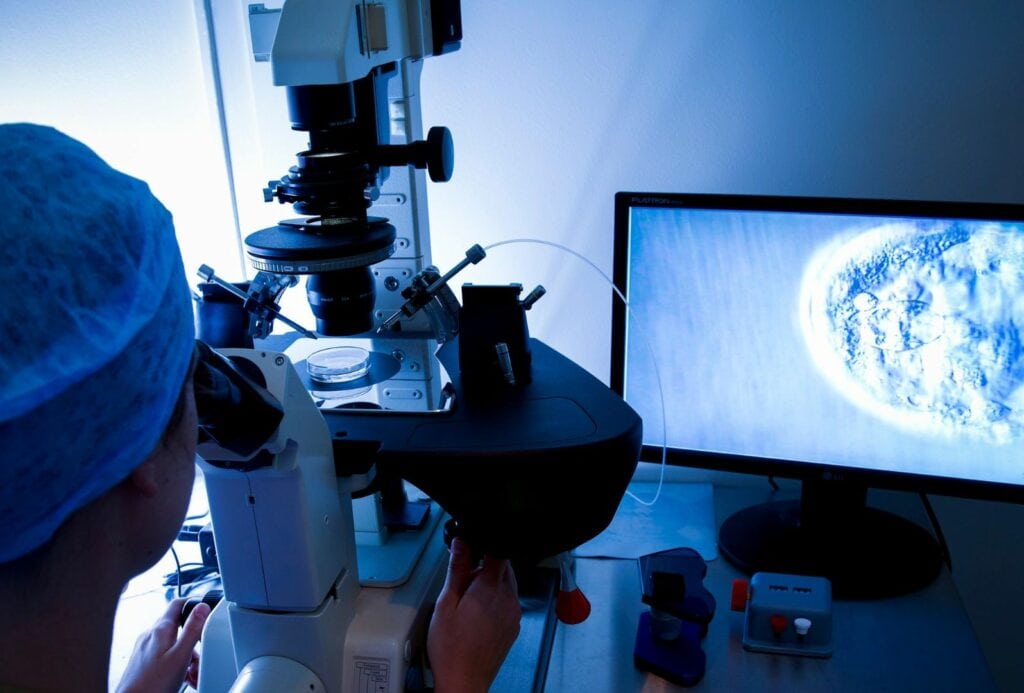
The Importance of Sperm Quality in IVF Fertility Treatments
Sperm quality is crucial in IVF, as healthy sperm are necessary for successful fertilization. Factors such as age, lifestyle habits, and underlying medical conditions can all impact sperm quality.
Techniques such as intracytoplasmic sperm injection (ICSI) may be used to improve sperm quality and increase the chances of fertilization. ICSI involves injecting a single sperm directly into an egg, bypassing any potential issues with sperm motility or morphology.
The ICSI procedure involves several steps. First, the eggs are retrieved from the woman's ovaries using ultrasound-guided aspiration. The eggs are then placed in a culture dish and prepared for injection.
Next, a single sperm is selected and immobilized using a microneedle. The needle is then used to inject the sperm directly into the egg's cytoplasm. After injection, the eggs are monitored for signs of fertilization.
The Role of Embryo Development in IVF Fertility Treatments
Embryo development is critical to IVF, as healthy embryos are necessary for a successful pregnancy. Following fertilization, the embryo undergoes a series of cell divisions, progressing from two to four cells. By the fifth or sixth day, the embryo reaches the blastocyst stage, marking the optimal time for transfer into the uterus.
Advancements in IVF technology have led to improved patient success rates and outcomes. For example, preimplantation genetic testing (PGT) can help identify congenital abnormalities in embryos before they are transferred into the uterus.
Other possibilities for improving embryo development and implantation include using artificial intelligence (AI) to analyze embryo images and predict which embryos will most likely result in successful pregnancies.
The Emotional and Psychological Impact of IVF Fertility Treatments
IVF can have a significant emotional and psychological impact on patients and their partners. Common challenges include stress, anxiety, and depression. Coping strategies such as therapy or support groups can help manage these challenges.
IVF Fertility Treatments
Research and development in IVF technology continue to advance, with potential innovations such as artificial intelligence and gene editing on the horizon.
IVF fertility treatments have helped millions of couples worldwide conceive and start families. Understanding the science behind IVF is crucial for making informed decisions about fertility treatments.
- Protecting Your Health: Choosing A Sperm Bank Over Natural Insemination
- Hatching a Plan: Learning The Basics About Assisted Hatching in IVF
- Navigating GYN Surgery Before Artificial Insemination
- PGT Testing and Its Role in IVF Treatment
- The Ultimate Guide To Where You Can Donate Sperm In All 50 States
The Average Success Rate for Artificial Insemination
Artificial insemination (AI) is a fertility treatment that involves placing sperm directly into a woman's reproductive system to increase the chances of pregnancy. It is a popular option for couples struggling with infertility or for same-sex couples who wish to conceive. The average success rate for artificial insemination ranges between 5% to 30% per cycle, and success can depend on several factors. Understanding these factors is crucial for making informed decisions about your fertility treatments.
Factors Affecting the Success Rate For Artificial Insemination
Several factors can affect the success rate of artificial insemination, including sperm quality, timing, age, and fertility drugs.
What's the most important factor? You guessed it; it's sperm quality! Healthy sperm is necessary for fertilization, and poor sperm quality can significantly reduce the chances of pregnancy. Timing is also crucial, as insemination must occur during the woman's fertile window. Age is another factor affecting success rates, as fertility declines with age. Fertility drugs are often used to stimulate ovulation and increase the chances of pregnancy. Finally, the selected method for artificial insemination can impact the outcome for success.
Understanding the Role of Sperm Quality in the Success Rate For Artificial Insemination
Sperm quality refers to the ability of sperm to fertilize an egg and produce a viable pregnancy. Various factors such as sperm count, motility, morphology, and DNA integrity determine the overall quality. High-quality sperm is essential for achieving successful pregnancies through artificial insemination. Poor sperm quality can lead to low fertility rates, reduced conception rates, and increased risk of embryonic loss.
The impact of poor sperm quality on fertility rates cannot be overstated. Women who inseminate with low-quality sperm can result in failed pregnancies or offspring with genetic abnormalities. Therefore, it is crucial to ensure that you are receiving high-quality sperm for your artificial insemination procedure.
Several factors can affect sperm quality, including environmental and genetic factors. Environmental factors such as temperature, nutrition, and stress can significantly impact sperm quality. High temperatures can damage sperm cells, while poor nutrition can lead to reduced sperm production and motility. Stress can also affect sperm quality by decreasing testosterone levels and increasing oxidative stress.
Genetic factors also play a crucial role in determining sperm quality. That's why we only accept high-quality applicants with desirable traits to improve the overall genetic quality of offspring produced through artificial insemination.
At Cryobank America, we offer premium-grade IUI vials. IUI vials are a great choice because they include sperm that has undergone a density gradient separation wash. This method purifies and isolates the healthiest cells, removing biological debris and seminal fluid, ultimately increasing your success rate. Click here to learn more about our vial types. Click here to view vial pricing.

The Importance of Timing in Artificial Insemination
Timing is crucial in achieving pregnancy through artificial insemination. The window of opportunity for successful insemination is relatively small, and missing it can significantly reduce the chances of conception. Sperm can survive in the female reproductive system for up to five days, but the egg is only viable for 12-24 hours after ovulation. Therefore, it is essential to time the introduction of sperm correctly to coincide with ovulation.
The timing of insemination can also affect the quality of sperm that reaches the egg. Sperm inside of the female reproductive system for too long may become less motile and less capable of fertilizing an egg. On the other hand, introducing sperm too early can result in a lower concentration of sperm, reducing the chances of successful fertilization.
Understanding the menstrual cycle and its phases is crucial to achieving successful insemination. The menstrual cycle is divided into three phases: follicular, ovulatory, and luteal. The follicular phase begins on the first day of menstruation and lasts until ovulation. During this phase, follicles in the ovaries mature and prepare to release an egg.
The ovulatory phase is when ovulation occurs, and an egg is released from the ovary. This phase typically lasts 24 hours but can extend up to 48 hours. Finally, during the luteal phase, the body prepares for pregnancy by thickening the uterine lining.
The timing of insemination is critical during the ovulatory phase since the egg is released from the ovary and travels down the fallopian tube. Therefore, tracking menstrual cycles can help determine when ovulation occurs and increase the chances of successful insemination.
The Impact of Age on the Success Rate For Artificial Insemination
The biological clock refers to the natural decline in fertility that occurs as women age. As women age, their eggs become less viable, and the chances of conceiving naturally or through fertility treatments decrease. This decline in fertility is due to a decrease in the number and quality of eggs available for fertilization.
Age also impacts the success rates of artificial insemination. Studies have shown that women over 35 have lower success rates with artificial insemination than younger women. Older women have fewer viable eggs and are more likely to have underlying fertility issues that can impact the success of the treatment.
Studies have shown that women under 35 have success rates of around 20% per cycle with artificial insemination; however, this success rate decreases as women age. Women over 35 have success rates of approximately 10% per cycle, and women over 40 have success rates of around 5% per cycle. Women are born with a finite number of eggs, and as they age, the number and quality of these eggs decline. When a woman reaches her mid-30s, her fertility begins to fall rapidly.
Other age-related factors impacting success rates include underlying fertility issues, such as endometriosis or polycystic ovary syndrome (PCOS), and lifestyle factors, such as smoking or obesity.
The Role of Fertility Drugs in Artificial Insemination
Fertility drugs are often used in conjunction with artificial insemination to increase the chances of pregnancy. These drugs work by stimulating ovulation and increasing the number of eggs available for fertilization.
Several fertility drugs are available, including Clomifene citrate (Clomid), Metformin, and Gonadotropins. These drugs can significantly increase the chances of pregnancy when used correctly.
Tips for Maximizing the Success of Artificial Insemination
Several lifestyle changes can help maximize the success rate of artificial insemination, including maintaining a healthy weight, reducing stress levels, and avoiding smoking and excessive alcohol consumption.
Choosing the proper fertility treatment and clinic is imperative for the best outcome. Preparing for the procedure by carefully following all instructions can also increase the chances of pregnancy. Finally, post-insemination care is crucial for ensuring a healthy pregnancy.
Advances in AI technology are continually improving success rates and making personalized treatments more accessible than ever. Understanding success rates is crucial for making informed decisions about fertility treatments and achieving a successful pregnancy.
- Protecting Your Health: Choosing A Sperm Bank Over Natural Insemination
- Hatching a Plan: Learning The Basics About Assisted Hatching in IVF
- Navigating GYN Surgery Before Artificial Insemination
- PGT Testing and Its Role in IVF Treatment
- The Ultimate Guide To Where You Can Donate Sperm In All 50 States
Understanding the Importance of Choosing the Right Sperm Donor
Choosing the right sperm donor is crucial for anyone considering donor insemination. The process of selecting a donor can seem overwhelming, but it is essential to take the time to make an informed decision. Like traditional conception, a sperm donor can significantly impact a child's health, development, and emotional well-being. In this article, we will explore the importance of choosing a suitable sperm donor and help guide you in making the best decision for you and your family.

Health and Genetic Factors to Consider When You Select Your Ideal Sperm Donor
A child's genetic makeup plays a significant role in their health and development. When choosing a sperm donor, one must consider their medical history and genetic health. Genetic conditions can be passed down from a parent to their child, and it is crucial to ensure that the donor does not carry any genetic mutations that could cause health problems for the child. That's why Cryobank America conducts rigorous screenings on all of our donors before their specimens are accepted into our program. These screenings include infectious and non-infectious diseases, a complete blood count, urinalysis, drug testing, and chromosome analysis. Once you've shown interest in a particular donor, we can provide you with their history of health, history of fertility, and family medical history.
In addition to physical health, the emotional and psychological impact of knowing one's biological origins is also essential to consider. Children conceived through donor insemination may have questions about their biological origins, so it is important to understand your donor's psychological traits. As part of joining our Sperm Donor Program, each donor must visit a psychiatrist and undergo a complete mental health evaluation. Cryobank America is one of the few clinics requiring this step to participate in a donor program.
Background and Educational Factors to Look For During Your Donor Search
Throughout your journey of finding a perfect sperm donor, there are factors to consider other than overall health and genetics. These include education, occupation, personal values, and interests.
Education and occupation can tell you a lot about a donor, such as their primary interests, level of intelligence, and how much drive and focus they acquire. Some parents may want a donor with a high education level or a particular occupation, while others may place less emphasis on these factors. Regardless of your preference, Cryobank America verifies this criterion with every donor who enters our program, requiring all potential donors to have a college degree. To ensure the safety of your selection, we also perform a complete criminal history background check on all of our donors.

Physical Characteristics and Traits are Good Things to Consider Before Making Your Sperm Donor Selection
Physical characteristics and traits are also important to consider. Some parents may want a donor with similar physical characteristics, while others may prioritize height, eye color, or hair color.
Personal values and interests can also be essential to consider. Some parents may want a donor who shares their religious or political beliefs, while others prioritize other values and interests.
Cryobank America has an eclectic roster of donors as we aim to provide various physical and personality attributes. Our donors fill out a characteristic questionnaire, write a handwritten letter, and create a donor essay, helping you feel like you've gotten to know them. When you sign up for our Premium Membership, you'll unlock this valuable information, additional childhood photos, and an audio interview!
The Role of Donor Profiles in Sperm Donor Selection
Donor profiles are an essential tool in the sperm donor selection process. Interpreting sperm donor profiles can be challenging, especially regarding medical terminology and genetic testing results. It's important to review each profile carefully and understand the information provided to identify any concerns. Look for donors who meet your criteria regarding medical history, physical characteristics and traits, education and occupation, and personal values and interests. Prioritize your preferences and decide based on what is most important to you and your family.
At Cryobank America, our basic donor profiles include one childhood photo, alias name, donor ID number, height, weight, blood type, hair color, eye color, skin tone, race, the highest level of education, and CMV status. These basic attributes will help guide you in selecting the perfect sperm donor.
Making the Decision to Choose Anonymous vs. Open Sperm Donors
There are legal and ethical considerations to consider when selecting a sperm donor. It is essential to understand the legal rights and responsibilities of sperm donors and recipients and to evaluate the ethical implications of donor anonymity and disclosure.
One of the most significant decisions parents must make when selecting a sperm donor is whether to choose an anonymous or open donor. Anonymous donors do not agree to be contacted by the child in the future, while open sperm donors accept the possibility of contact.
There are benefits and drawbacks to both anonymous and open sperm donors. Anonymous donors provide privacy and anonymity that some parents may prefer. In contrast, open donors allow for the opportunity for the child to learn more about their biological origins.
Select Your Ideal Sperm Donor: Tips and Resources for Success
Finding the ideal sperm donor may seem complicated; that's why we've gathered many resources to help keep you on the right track! Our reputable donor database provides a wealth of information about our donors, and there are many helpful articles and tips available for guidance and support right here on our website.
Choosing the most suitable sperm donor is crucial for anyone considering donor insemination. By taking the time to make an informed decision, you can ensure the best possible outcome for your child's health, development, and emotional well-being.
Click here to get started or click here to learn about our Conception Commitment™ Program!
- Protecting Your Health: Choosing A Sperm Bank Over Natural Insemination
- Hatching a Plan: Learning The Basics About Assisted Hatching in IVF
- Navigating GYN Surgery Before Artificial Insemination
- PGT Testing and Its Role in IVF Treatment
- The Ultimate Guide To Where You Can Donate Sperm In All 50 States


